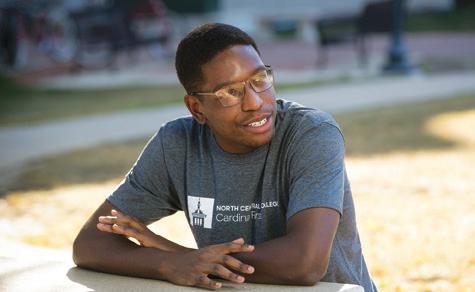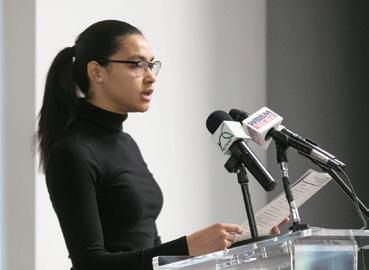
9 minute read
Diversity, equity and inclusion: Campus efforts address need for continual change
“Our focus moving forward should always be to listen to the students.” DAVIN ALLEN ’20/M ’22
The first priority has been a focus on better communication. “Our students and alumni have stories to share about their experiences,” said President Troy Hammond. “I want to ensure that these stories inform and affect our actions moving forward.”
President Hammond has outlined a list of listening sessions with Black students, faculty and staff, and a campus-wide climate study. In June, Hammond participated in a virtual campus town hall on racial issues affecting the College and Naperville.
“We have tried to do good work along this journey, but we have made mistakes,” said Hammond. “I learned from listening to our students and alumni that there is still much more to be done before we begin to resemble our vision of a diverse and inclusive community.”
Listening to students is an important part of making progress, agreed Davin Allen ’20/M ’22, graduate assistant for first generation programs. “I believe the last two years have been critical for change on our campus,” he said. “Our students will no longer accept the bare minimum effort to support minority students. Our focus moving forward should always be to listen to the students. We must be willing to hear them in whatever form that takes and begin to formulate intentional actions that work best not to solve these problems temporarily, but consistently.” Allen recently joined the College’s Diversity, Equity and Inclusion Task Force, which is well-established on campus and provides leadership for many campus initiatives. The task force helped respond to calls for change from alumni and students this summer and led efforts to build a resource on the Oesterle Library website called the Black Lives Matter Lib Guide in collaboration with the Center for the Advancement of Faculty Excellence and Oesterle Library.
The task force is co-chaired by Dorothy Pleas, assistant dean of students and director of multicultural affairs, and Stephen Maynard Caliendo, dean of the College of Arts and Sciences, and supported by Rebecca Gordon, assistant vice president of equity, diversity and inclusion.
Going forward into 2020-2021, all College students will participate in two diversity and equity workshops each semester—up from one last year. Faith and Action programs will focus on antiracism and activism themes. Project Re-Connect: NCC Movie and Dialogue Club will continue to invite students, faculty and staff to explore racial themes (see p. 17) and new dialogue training resources are available through the Center for Social Impact and the Office of Multicultural Affairs. “As a predominantly white campus, marginalized students are often underrepresented in campus programs and leadership positions,” said Milia Harris ’20/M ’22, who is a graduate assistant in the Center for Social Impact. “My priority is to make sure the minority identities become exponentially represented in these opportunities moving forward.”
Additional commitments to progress include holding faculty and staff hiring managers accountable for efforts to recruit and retain people of color and requiring regular reporting of student retention data by race.

MILIA HARRIS ’20/M ’22
IN A MOVING SPEECH TO NORTH CENTRAL COLLEGE FACULTY AT THE START OF THE ACADEMIC YEAR, DR. ABIÒDÚN “G-P” GÒKÈ-PARIOLÁ, PROVOST AND VICE PRESIDENT FOR ACADEMIC AFFAIRS, SHARED HIS PERSONAL PERSPECTIVE ON RACIAL JUSTICE:
“We have all witnessed the reinvigorated push for racial justice in this summer of discontent. A successful response to the needs that our students and alumni of color have articulated requires a clear understanding of what they experience on campus—in residence halls and, yes, in our classrooms—and in the larger community.
This is deeply personal, but I see no other way to communicate how institutionalized and deeply ingrained racism affects those who suffer from its effects. I will make this personal because for those who suffer the effects of racism it is always personal, never academic. It strikes at the essence of who you are as a human being.
When I first came to the United States to complete my doctoral work at the University of Michigan in 1980, I understood little about racism beyond what I had read in history books and learned via news reports. I actually didn’t know I was Black: I thought I was a Yoruba, sometimes a Nigerian and kind of African. My sojourn here then lasted only a couple of years. In the 32 years since I returned and reestablished my professional life and tried to raise five children here, I have gained a firsthand understanding of racism and its consequences. Sometimes racism comes in the form of overt speech or action. Though no less painful, in that form you can label it and most times let it wash over you.
More pernicious in their effect are the non-overt forms of racism, the microaggressions … the subtler forms exhibited by those with whom we work, sometimes friends and, often, those who would be aghast at the suggestion that they might have a single bone of racism in their body. It is the constant feeling that, regardless of how much one achieves in life, one has to constantly prove one’s worth, one’s integrity, one’s right to be judged fairly. It is knowing that people readily assume the worst of you… just as they readily believe the least of you.
Sadly, all too often, this mindset results in the tragic loss of life …. In less lethal situations, one just gets worn down and weary of the daily grind of proving one’s right to be here.
These are a just a few examples from my own life:
• I was introduced as a new dean … and one of the guests shook my hand and said: “I had a very good, smart friend who applied for the job, but they wanted somebody black.” • I remember arriving at a country club to pick up my son and my daughter after a school dance organized by the private high school they attended and being handed a set of keys by a parent who wanted me to retrieve his car.
• I remember attending a function at another university where I served as special assistant to the president and a guest handing me his empty glass and telling me he’d like a gin and tonic. • And I remember the fear and anxiety
I’ve experienced each time I was pulled over by a police officer and the shame that washed over me if my kids were in the car with me, as I became extra deferential because I wanted to be sure
I got out of the traffic stop alive.

it is always personal, never academic.”
I have been a professor for 45 years—the last 25 of those as a full professor—a school dean for five, and a chief academic officer/provost for 15 years. Yet such experiences remain a big part of my life.
In a recent conversation about Black Lives Matter with my daughter (a sophomore at North Central), I shared examples of racism I have experienced and continue to experience as a citizen of this country. She said, ‘But Papa, you are in a position of power… and yet you continue to have these kinds of experiences …. Imagine what we as powerless students experience and feel on a daily basis?’
I had no response. Even I, a parent to several children of color, cannot claim to understand the wounds they receive daily because I do not live their lives. Racism is a potent brew that no one who has lived in this society can avoid imbibing. It is deeply ingrained and has to be purged constantly.
Each and every one of us has an affirmative responsibility to ensure that ours is a just, inclusive and equitable community.
Without that commitment to all members of our community, we will not be successful in meeting our goal of sending forth into the world students who will live lives of purpose and reconciliation.”
ATHLETICS DEPARTMENT OUTLINES ACTION PLAN
Another major initiative is the creation of an Athletics Diversity, Equity and Inclusion Council, with representation from student-athletes, coaches, faculty and staff. The council has been charged with ensuring that athletics grows as a community by embracing similarities and differences, listening and being open to multiple perspectives and thoughts, and engaging in meaningful action to recruit and retain diverse community members.
“I will volunteer my time to fight for my Black community, my family, and those who feel as if they don’t have the strength to continue to fight. I hope that people’s stereotypes and racist thoughts begin to change,” said council member Mitrese Smith ‘22, a sociology major and member of the women’s basketball team.
The council will plan and conduct forums for student-athletes, coaches and administrators; make efforts to diversify the athletics staff; conduct anti-racism training; and roll out a social media campaign, “Be the Change.”
“We understand that this is a time of learning and growing for our department,” said Jim Miller ’86, athletic director and chair of the council. “We need to listen to each other and figure out the best path forward, together.” Added President Hammond: “We need active participation across the entire College to address diversity, equity and inclusion initiatives. Every single one of us has a role to play in making ours an inclusive community.
“I thank all of the students, faculty, staff, and alumni of color who have had the strength, courage, and commitment to justice ... to challenge us. I pledge that I personally, and this College as an institution, will do better.”
For more information, visit northcentralcollege.edu/diversityinclusion.
To learn more about the Athletics Diversity, Equity and Inclusion Council, and to see the full membership list, go to northcentralcardinals.com/ news/2020/8/10/general-diversityequity-and-inclusion-councilintroduced.aspx.
To provide feedback or suggestions to the Task Force for Diversity, Equity and Inclusion, email a co-chair: djpleas@ noctrl.edu or smcaliendo@noctrl.edu.

MITRESE SMITH ’22
On-Demand Goes to School
Pandemic pasttime adds new viewpoints to engage students
During the COVID-19 pandemic, many of us have turned to streaming channels for entertainment, enrichment and escape, making the most of a difficult and complicated moment in history. According to HUB, an entertainment research organization, 28 percent of us have signed up for a new streaming service since February.
Many North Central College faculty are also fans of streaming channels and are finding content that engages students. “Having students connect popular culture to class content almost always increases engagement,” said Shelley Birdsong, associate professor of religious studies. “I like shows that tell a story and allow students to connect to a character. I am also a fan of documentaries that can sum up data in digestible and beautiful ways.”
We asked North Central faculty about the shows that they connect to their courses and add academic dimensions, in hopes that our readers find new ways to explore important topics and the world outside their homes.







